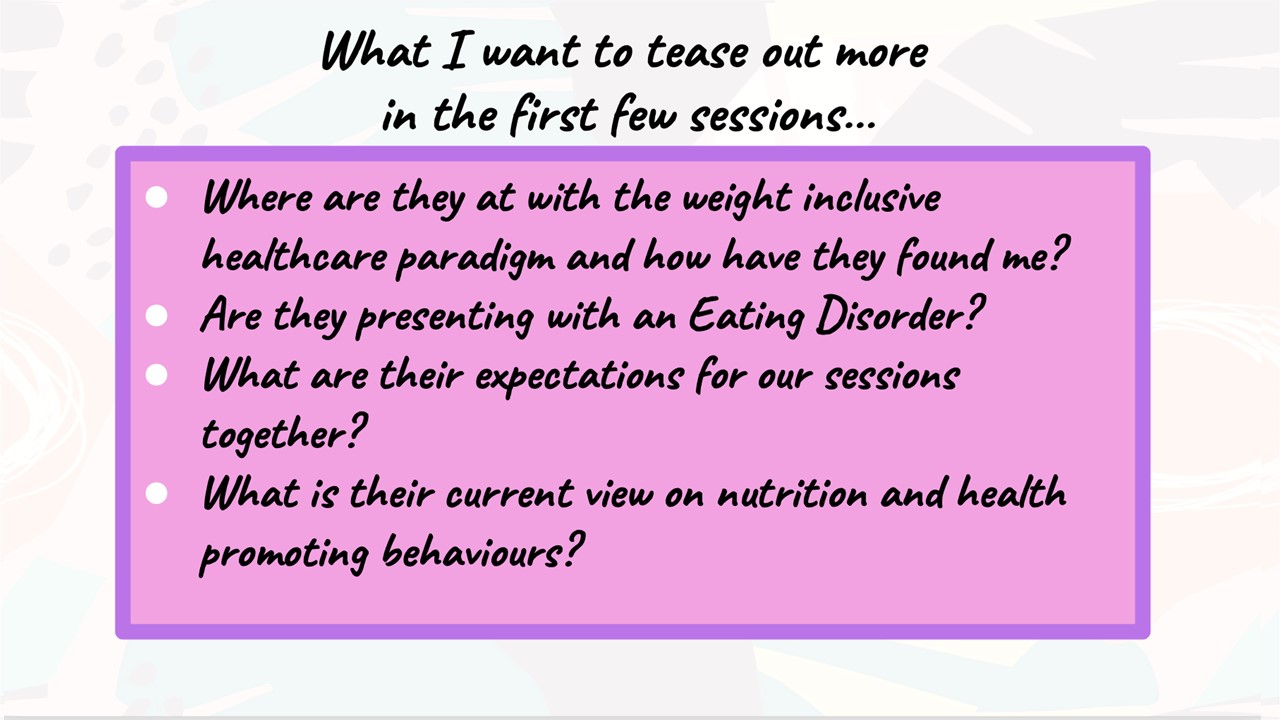Shifting negative attitudes toward food and body. Part 1
 Anthea Talliopoulos, APD
Anthea Talliopoulos, APD
Shifting negative attitudes toward food and body. Part 1 Exploration of the clients’ concerns and psychoeducation by Marina Payne, APD, CEDC
Diet culture undeniably impacts all of us, whether in a more or less direct way, we are constantly receiving harmful messages relating to our bodies and our eating habits. While the weight inclusive (non-diet) paradigm has been increasingly heard of amongst dietitians, it is yet to be known of and integrated into practice amongst other mainstream health professionals and the general public. The weight inclusive paradigm can offer an alternative model to traditional weight-centric care.
Through the use of a case study, Marina Payne (credentialled eating disorder clinician and APD) describes the practical exploration of diet culture, body image and the associated negative attitudes which clients present commonly with. She explains that eating disorder screening is critical in clients presenting with weight cycling concerns, and that underlying behaviours should be addressed, with a focus on autonomy and self-trust to respond to internal hunger cues.
Understanding and exploring ‘the dieting cycle’ is fundamental, with restriction and deprivation often resulting in an increased diversion to ‘soothing foods’, exacerbating emotional eating and only increasing client distress over time. In practically applying a weight inclusive paradigm to our clinical practice, exploring client expectations is key, correcting any misinformation, and providing well-timed and relevant pschoeducation; this can include explaining the set point theory, the benefis of food exposure, the limitations of BMI (if applicable), and discussing the hierarchy of nutrition needs.
Overall, in working with clients in shifting negative attitudes toward foods and our bodies, maintaining a sense of curiosity, remembering that all client journeys are different, and in ensuring a long-term focus on self-trust is maintained, can help to debunk diet culture myths and improve client outcomes long-term.
Summary:
- The weight inclusive paradigm can offer an alternative model to traditional weight-centric care, debunking diet culture.
- In shifting away from diet culture, it is critical that underlying behaviours towards food and body are addressed, with a focus on autonomy and self-trust to respond to internal hunger cues.
- Correcting misinformation and providing relevant psycheducation is key, such as through explaining the ‘set point theory’, the benefis of food exposure, the limitations of BMI (if applicable), and discussing the hierarchy of nutrition needs.
- In exploring underlying eating behaviours, embracing our underlying physiological capabilities and internal cues of making well-informed food choices in response to our environment is critical in ensuring longer-term satisfaction with our relationship with food and our bodies.
Marina Payne is a credentialled eating disorder clinician and APD who has worked in a collaborative team of healthcare professionals in the area of eating disorders for four years. Marina understands the need to tailor her approach appropriately as she recognises that her clients will bring forth their own unique experiences. Marina uses the non-diet approach and works within a weight-inclusive healthcare paradigm to assist her clients in turning towards their own body’s inner wisdom.
To register for the presentation and associated documents including the assessment quiz click here

